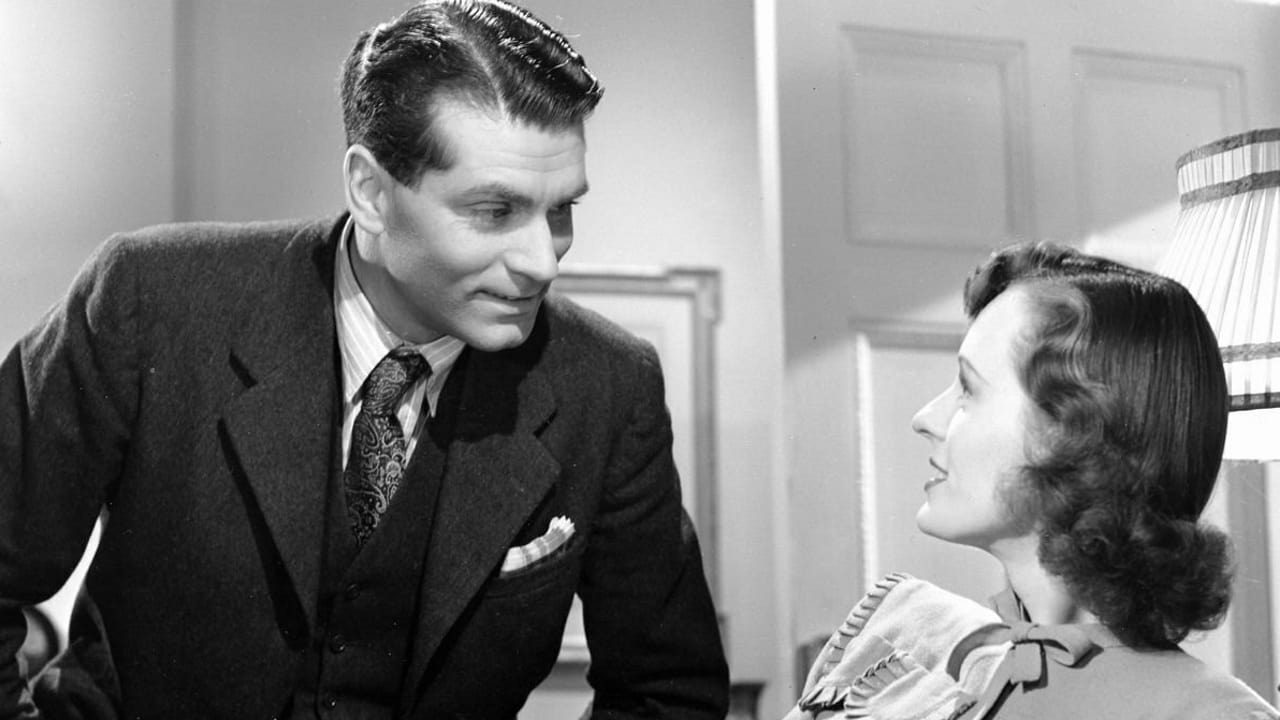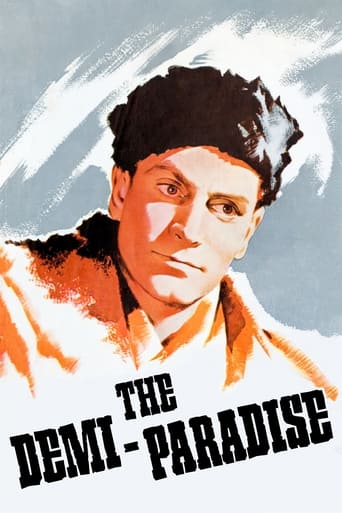SteinMo
What a freaking movie. So many twists and turns. Absolutely intense from start to finish.
CrawlerChunky
In truth, there is barely enough story here to make a film.
Cassandra
Story: It's very simple but honestly that is fine.
Brooklynn
There's a more than satisfactory amount of boom-boom in the movie's trim running time.
robertguttman
One has to keep in mind that this British comedy, about the experiences of a Soviet engineer in Britain, was produced at a critical point in the relations between those two nations. Due to the fact that Joseph Stalin had signed a non-aggression pact with Adolf Hitler, the Soviet Union remained neutral after Britain and France went to war against Germany in 1939. The Soviets didn't come into the war as an ally of Britain until the middle of 1941, after Germany invaded Russia. It was not an easiest alliances. Unlike the case of Britain and the United States, Britain and the Soviet Union had almost nothing in common, either politically or linguistically. In fact, British relations with the Soviet Union had been strained ever since the 1917 Revolution.The Demi-Paradise was produced as an aid to bridging the cultural gap between those two allies, at least from the British point of view. I have no idea whether it was ever shown in Russia, let alone how it would have been perceived by audiences there. The story concerns a Russian engineer, played by Olivier, who encounters a pair of British seamen ashore in Murmansk during World War II. Typically, the British are complaining about the difficulties they are having among the "foreigners". To their astonishment, Olivier jokingly informs them in English that it is they who are the "foreigners" in Russia, and then proceeds to recount his own experiences as a "foreigner" when he was assigned to do a job in Britain both before, and during, the war. In addition to being a wartime propaganda film, The Demi-Paradise is full of the sort of self-deprecating humor the British seem to love. While produced in Britain, the script actually was written by a Russian ex-patriot, Anatole de Grunwald. Consequently, one cannot help but feel that the writer brought a lot of his own personal experiences and impressions into the story. The result is very droll, and one cannot help but feel that the protagonist's experiences are probably universal to any stranger in a strange land.
cherimerritt
Young Russian inventor Ivan Kouznetsoff (Sir Lawrence Olivier) brings his new design and prototype for an underwater ice-breaker propeller to pre-war England (1938-39) in hopes of presenting it to world famous engineer and shipbuilder, Mr. Runalow (Felix Aylmer), hopefully for production. He coincidentally meets Mr. Runalow's granddaughter, Ann (Penelope Dudley-Ward), who takes him under her wing and home to the family. Culture shock (in both directions) permeates his every experience and interaction. The development of mutual understanding is the sub-plot, hastened by Hitler's invasion of Russia during Kouznetsoff's second trip to England and its subsequent synergy of combined effort to assist Russia and to complete the ship with the cutting edge propeller.Having worked for 2+ years with émigrés from Russia who lived through WWII and were contemporaries with this film, Olivier's interpretation of Russian sensibility was of great interest to me and he did a very fine job. One of Olivier's best performances, in this writer's opinion. Well written script and dialog. Performances of Felix Aylmer and Penelope Dudley-Ward were quite enjoyable. Felix Aylmer as a wise genius in this film bears notice in contrast to his role as Polonius in Olivier's Hamlet. The film held my undivided attention the entire two hours.Highly recommended for anyone with high interest in inter-cultural relations. Given human nature's propensity for alienating others who display any differences, the making of this film was a stroke of genius. Hopefully it was widely viewed at that time (1943) and provoked reflection. If a picture is worth 1000 words, a moving picture is worth 1000 pictures. Kouznetsoff's speech at the ship's christening and launch is priceless - remarkably apt and inspiring.
mbrachman
This delightful romantic comedy has a situation similar to "Ninotchka" from several years earlier, but with the genders reversed: Loyal but somewhat naive Soviet apparatchik visits a Western capitalist country on serious business, is squired through the strange ways of his/her host nation by a light-hearted but likable native toward whom he/she develops romantic feelings, and alters his/her views on Soviet/West differences. Garbo and Douglas were incomparable in "Ninotchka," but Olivier, in an offbeat role for him, and Dudley Ward hold their own in this comic exploration of people's preconceived ideas about one another (the Russian assumes all English businessmen are "exploiters," the English boarders at a rooming house won't eat at the table with "one of them (a Russian communist)." Definitely worth seeing.
theowinthrop
I mentioned when reviewing THE LIFE AND DEATH OF COLONEL BLIMP that David Low played no favorites with his cartoons. In the 1930s he attacked all the great dictators (Hitler, Mussolini, Franco, and Stalin). He also found his reactionary Colonel useful to attack any other types of reactionaries. In 1941, after Churchill declared he would send aid to Communist Russian against their common enemy Germany, Russian hard liners screamed about trusting Imperial Britain. Low made a cartoon on this, with a Russian hardliner who was the Colonel, but now called "Blimpski".Still the Anglo-Communist alliance was a difficult one to totally accept, even when one realized it's total necessity against Nazi barbarism. THE DEMI-PARADISE illustrates this problem. Laurence Olivier is a committed Communist Russian engineer, trying to perfect a torpedo for his nation's war effort. Stalin's government arranges to send Olivier to England to work with English naval experts to make his new form of gyroscope work.The problem is that Olivier is totally suspicious of his hosts. He is a man in his early 30s, and he has been brought up to suspect that Britain (like Germany and Italy) is against the Soviet Union. After all, it was against the Soviet Union for decades. So the film follows as Olivier gets use to the vagaries of the British character he meets with in different English men and women. Gradually he learns to trust them but it takes quite a while.The film has it's problems. Olivier prided himself on his abilities with accents, but in truth (seeing his movie and television performances today) when he plays English or American people he sounds realistic. When he tries foreign accents one cringes. He copies Albert Basserman (including shrugs) when he does Germans (or German Jews). His Russian engineer, at first, sounds realistic - but he also sounds slow witted. To be fair with Olivier his engineer is speaking a second language (but no Russian is heard in the film). He speaks definitively and slowly - and it gets to be a drag. A real Russian would have a faster clip to his words (unless, as I said, he was slow witted).The best parts are the various British character actors, teaching the Russian visitor about the traditions and their importance to Britains. Olivier does point out some of them are silly (which occasionally the others agree). For example, there is a yearly "historic" pageant in the town, and Margaret Rutherford runs it. One of the highlights is a reenactment of the moment in late June 1815 when a coach arrived in the town announcing the battle of Waterloo. A bemused Felix Aylmer (the head of the local ship yard, and a host for Olivier) looks at this moment which he has seen for umpteen times before, and says out loud, "I wonder who won!" The film, as a morale booster, was good. As a reminder of a critical wartime problem (that fortunately was overcome long enough to defeat the Nazis) it is rather special.

